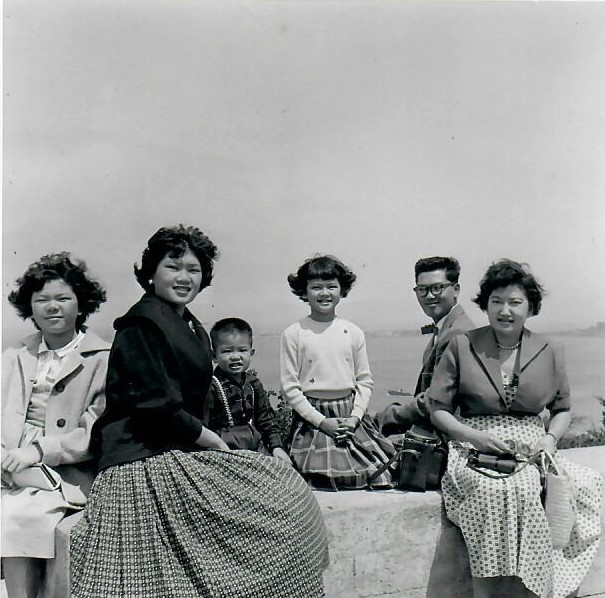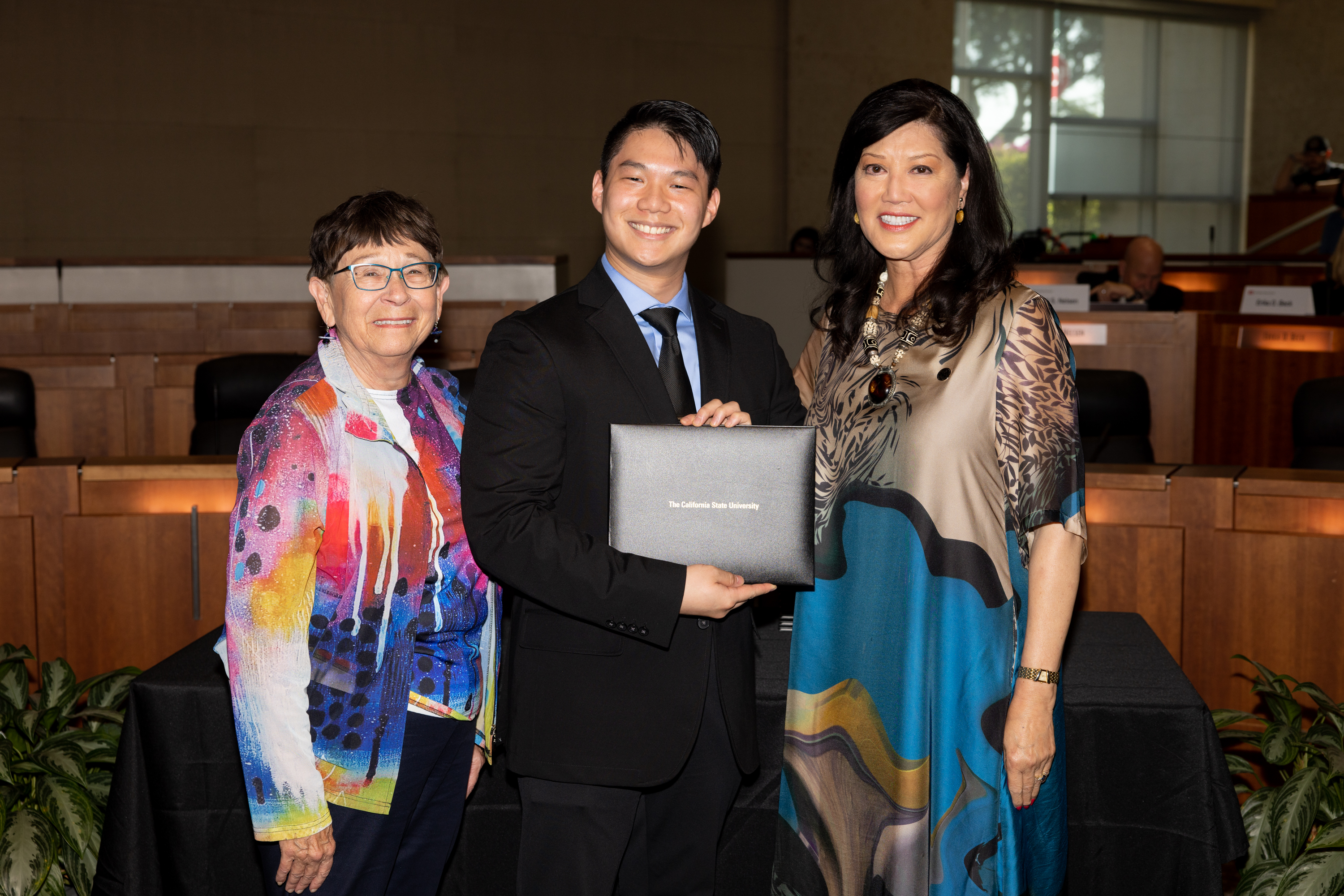You may think sitting on the board of a public university is a far cry from working in the entertainment industry, but there is one similarity—the jam-packed schedule. Whether attending a board meeting, participating in leadership interviews, meeting with students or sharing the California State University's impact with legislators in the nation's capital, Wenda Fong is full of energy and passion.
“Every day is CSU!" she says with a wide smile.
Throughout her life, Fong has been an advocate for Asian American and other marginalized communities through her 40-plus-year career in the entertainment industry, and since 2018, through her service to higher education as a member of the CSU Board of Trustees.
“Since high school, I worked to raise representation and visibility of Asian Pacific Islander Desi Americans," Fong says. “My work in diversity, equity and inclusion has been a parallel career as I worked in the entertainment industry, and I am deeply honored and grateful for the privilege to now serve the CSU."
Fong's trajectory to higher education leadership began 120 years ago when her grandparents immigrated to California from China. Her grandparents all made sacrifices to support their families and to provide them with better opportunities, like her maternal grandfather who even worked four jobs as a cook.
Growing up, Fong's mother, Margaret Choy Fong, would often tell her the reason her grandparents left China was so that their children and grandchildren would not have to lift anything heavier than a pencil.
“Higher education changes lives; it changes entire family trees," Fong says. “My grandparents' hardships and backbreaking work resulted in their granddaughter being given the opportunity to serve as the first Asian American chair of the CSU Board of Trustees—can you imagine how proud they would be to know that?"
HONORING PAST AND PRESENT
In addition to being a proud first-generation American, Fong's mother celebrated her Chinese heritage and instilled the same sense of admiration in her five children. She taught them about Chinese traditions and customs in tandem with Wenda Fong (center) with her mother, Margaret Choy Fong (right), and siblings. American ones, celebrating the Chinese New Year as passionately as the Fourth of July holiday. She also taught them to revere Ching Ming—a day to remember and honor deceased relatives.
Wenda Fong (center) with her mother, Margaret Choy Fong (right), and siblings. American ones, celebrating the Chinese New Year as passionately as the Fourth of July holiday. She also taught them to revere Ching Ming—a day to remember and honor deceased relatives.
Fong says conversations with her mother were sprinkled with tidbits that were lessons in respect for her Chinese culture. When prompted by a subject, she would proudly list the myriad inventions by the Chinese such as paper, the compass, printing, fireworks and paper money.
“She also told me stories about my grandparents and my father that filled me with enormous pride, but also sometimes sadness and anger. Stories about their sacrifices, hard work and perseverance to overcome and succeed in the face of obstacles like racism, and laws like the
Chinese Exclusion Act."
From an early age, Fong loved to watch television and was an avid movie goer. But she quickly became aware of the lack of Asian influence in the entertainment industry. Fong would often make her mother stay with her to watch a movie's closing credits to seek out Asian names. There often weren't any, she says, and if there were, many times the roles were quite small and even harmful to the characterization of Asian people.
Fong eventually co-founded Asian Americans for Fair Media to help combat these negative depictions, and she and other members would write letters or make calls to movie studios when they saw a negative depiction of an Asian character. And, later in life, she says whenever she had an opportunity to hire people, she made sure there was a diverse selection.
She continues to use her influence to change the perception of the APIDA community. In 2021, Fong
produced a public service announcement (PSA) to combat anti-Asian hate that included leading actors like Ken Jeong, and an A-list production team who joined her in volunteering their time, talent and more. The PSA played in AMC Theatres across the country for the month of May, and it was so popular that AMC decided to run it again this May.
 Wenda Fong working as the producer of a television special, "Opening the Lost Tombs: Live from Egypt," in 1999. After getting her start as the host of her own live talk show series in Los Angeles, Fong went on to produce and direct musical variety and reality specials, awards shows, sitcoms, talk shows, documentaries and even live events—launching productions across the United States and around the world, including China, Canada, Europe and Africa.
Wenda Fong working as the producer of a television special, "Opening the Lost Tombs: Live from Egypt," in 1999. After getting her start as the host of her own live talk show series in Los Angeles, Fong went on to produce and direct musical variety and reality specials, awards shows, sitcoms, talk shows, documentaries and even live events—launching productions across the United States and around the world, including China, Canada, Europe and Africa.
She has worked with luminaries such as President Barack Obama, Beyoncé, Bruno Mars, Michael Jackson, Taylor Swift, Madonna, Harry Styles, Lady Gaga and even Elvis Presley. She also holds the dual distinction of being the first person of color and first woman to have produced the Emmy Awards—a feat that wasn't seen again until 30 years later.
Of her career, Fong says: “It's been an extraordinary adventure—one beyond my wildest dreams." And one that required an extreme level of dedication and commitment.
STANDING OUT
Like any pioneer inevitably does, Fong faced some challenges. At the beginning of her career in 1974 and for many years, she was the only Asian American woman working on the set. She clearly stood out.
“I felt a responsibility to my community," Fong says. “I had to stand tall and be aware of how I carried myself because I knew that I was being judged for all Asian people."
Fong also experienced gender discrimination and was even passed over for a job as the producer of a new sitcom after the showrunner told her point-blank that he was uncomfortable working with a woman.
“I actually learned a lot from people who put up barriers—who made things very difficult for me—and I learned how to overcome challenges," she says.
The barriers she faced inspired her to create her own support networks, including the
Coalition of Asian Pacifics in Entertainment (CAPE), which began in 1991 and is the largest, longest-running and one of the most influential organizations for APIDAs in the entertainment industry.
“Being the first and only inspired me to help others follow me and climb onto my shoulders," she says. “It's why I co-founded CAPE and the Asian American Committee for the Directors Guild of America, and why I left producing to launch the Creative Diversity Development Department at the Fox Broadcasting Company."
While in her role at Fox, Fong launched a writers assistant program as an entry into the writer pipeline and, specifically, into the hallowed and all-important writers room.
“I am so proud that several of those diverse writers assistants did well and were hired permanently and moved up the ladder," Fong says. “Several became producers, and one is a very successful and well-respected showrunner."
FROM HOLLYWOOD TO THE BOARDROOM
While Fong may have been slightly surprised at her appointment to the CSU Board of Trustees in 2018, she is thrilled and grateful for the opportunity.
“When I say that this is the greatest honor and privilege of my life—advancing the CSU's mission to elevate lives and communities through the transformative power of higher education—I truly mean it.".jpg) Wenda Fong (right) and Interim CSU Chancellor Jolene Koester supporting San Diego State's men's basketball team at an NCAA National Championship game.
Wenda Fong (right) and Interim CSU Chancellor Jolene Koester supporting San Diego State's men's basketball team at an NCAA National Championship game.
The
Board of Trustees is responsible for the oversight of the CSU, adopting rules, regulations and policies governing the university. It is made up of 25 members, 16 of whom (including Fong) are appointed by the governor. And it's an unpaid position. No trustee—except for the chancellor and the faculty trustee—receives any salary for their service.
During her time as a member, vice chair and chair of the Board of Trustees, Fong has helped to advance educational equity, and she is proud of the progress the university has made regarding support for APIDA and otherunderrepresented students.
Most recently, the CSU celebrated the opening of the university's newest
APIDA Student Center at Sacramento State in February and announced the establishment of the
CSU Asian American, Native Hawaiian and Pacific Islander (AANHPI) Student Achievement Program in April.
“This [progress] is reflective of the CSU's broader goal to help all of our students establish a sense of well-being and belonging on their campus where they can be successful and progress to graduation, so they can join the over four million living alumni who are making a positive impact in their communities, in our state and for our nation."
Never one to be afraid of standing out, Fong is easy to spot at the bimonthly meetings of the CSU Board of Trustees. She's colorfully clad in professional attire, and her warm smile and positive attitude brighten any room. Fong says she hopes she is a role model worthy of inspiring California's college students.
“If you can see it, you can be it," she says. “That's the message I hope to convey—as a woman and as an Asian American—to the students of the CSU."
Read Chair Fong's biography to learn more about her career accomplishments and her contributions to the CSU.

Interim CSU Chancellor Jolene Koester (left) and Chair of the CSU Board of Trustees Wenda Fong (right) presenting Cal Poly Pomona student Chiefe Mo with a Trustees' Award for Outstanding Achievement. Mo was the 2022 CSU Trustee Chair Wenda Fong and Daniel Fetterly Scholar.
.jpg)
As of March 2023—for the first time in the CSU's history—all four of the university's top leadership positions were held by women: (from left) Chair of the Academic Senate CSU Beth Steffel, Interim CSU Chancellor Jolene Koester, Chair of the CSU Board of Trustees Wenda Fong and Executive Vice Chancellor for CSU Academic and Student Affairs Sylvia A. Alva.
%20(1).jpeg)
Chair of the CSU Board of Trustees Wenda Fong (third from left) in Washington D.C. in April 2023 for CSU Hill Day. Pictured here with (from left) SF State Associated Students (AS) Director of Government and Community Relations Steven Lee, SF State AS President Karina Zamora, House Speaker Emerita Nancy Pelosi, Interim CSU Chancellor Jolene Koester and Vice Chair of the CSU Board of Trustees Jack B. Clarke Jr.
.jpg)
Chair of the CSU Board of Trustees Wenda Fong (center) and Cal State East Bay President Cathy Sandeen (left) at a systemwide alumni event at Nationals Park in Washington D.C.
.jpg)
CSU Dominguez Hills President Thomas A. Parham (center) cutting the ribbon at the opening of the Toro Esports Academy in April 2023, aided by Chair of the CSU Board of Trustees Wenda Fong (second from right).
.jpg)
Wenda Fong serving as the emcee of the Social Mobility Symposium presented by CSU San Marcos in 2022.
Photo courtesy of CSU San Marcos/Andrew Reed.
Previous
Next